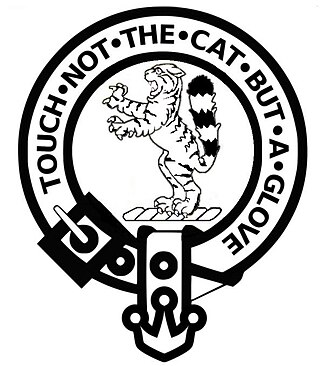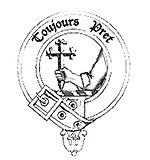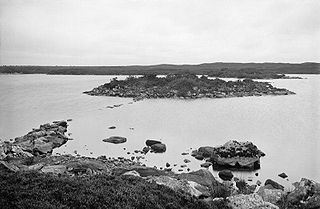Fort William is a town in the Lochaber region of the Scottish Highlands, located on the eastern shore of Loch Linnhe in the Highland Council of Scotland.

Clan Campbell is a Highland Scottish clan, historically one of the largest and most powerful of the Highland clans. The Clan Campbell lands are in Argyll and within their lands lies Ben Cruachan. The chief of the clan became Earl of Argyll and later Duke of Argyll.

Clan Maclean is a Highlands Scottish clan. They are one of the oldest clans in the Highlands and owned large tracts of land in Argyll as well as the Inner Hebrides. Many early MacLeans became famous for their honour, strength and courage in battle. They were involved in clan skirmishes with the Mackinnons, Camerons, MacDonalds and Campbells, as well as all of the Jacobite risings.

Clan Chattan is a unique confederation of Highland clans. This distinctive allied community comprised at its greatest extent seventeen separate clans, who each had their own clan chief recognized under Scottish law, but were further united and bound to the superior chief of the Confederation for mutual solidarity, sustenance and protection in the Middle Ages and early modern period in the Great Glen and Cairngorms. A tribal coalition of this magnitude was a source of apprehension to both the Lord of the Isles and the Kings of Scots and records exist of machinations to "crying doon the Clan Chattan" by formenting internal dissension.

Clan Cameron is a West Highland Scottish clan, with one main branch Lochiel, and numerous cadet branches. The Clan Cameron lands are in Lochaber, and within their lands lies Ben Nevis, the highest mountain in the British Isles. The Chief of the clan is customarily referred to as simply "Lochiel".

Clan MacDonald of Keppoch, also known as Clan MacDonellof Keppoch or Clan Ranald of Lochaber, is a Highland Scottish clan and a branch of Clan Donald. The progenitor of the clan is Alistair Carrach MacDonald, 4th great-grandson of the warrior Somerled. The clan chief is traditionally designated as the "Son of Ranald's son".
The MacDonalds of Ardnamurchan also known as MacIain of Ardnamurchan, or Clan MacIan, were a Scottish family and a branch of the larger Clan Donald.

Clan MacDonald of Dunnyveg, also known as Clan Donald South, Clan Iain Mor, Clan MacDonald of Islay and Kintyre, MacDonalds of the Glens (Antrim) and sometimes referred to as MacDonnells, is a Scottish clan and a branch of Clan Donald. The founder of the MacDonalds of Dunnyveg is Eòin Mòr Tànaiste Mac Dhòmhnaill, a son of Iain Mic Dhòmhnaill and Margaret Stewart of Scotland, daughter of King Robert II. Members of the clan actually pronounced and spelled their name M'Connall due to the Gaelic pronunciation of the name Mac Domhnuill thus giving rise to the surname McConnell and its variants. While historically recognised as a clan by the Court of the Lord Lyon, it is now an armigerous clan as it no longer has a chief. The last chief was Sir James MacDonald, 9th of the Clan MacDonald of Dunnyveg or Clan Donald South, who died in London in 1626.

Clan Macfie is a Highlands Scottish Clan.

The Battle of Lochaber was fought in 1429, in the Scottish Highlands, between the forces of Alexander of Islay, Earl of Ross, Lord of the Isles and chief of Clan Donald against the Royalist army of King James I of Scotland.

The Stand-off at the Ford of Arkaig occurred in September 1665 at Achnacarry, about 10 miles (16 km) northeast of Fort William, Scotland. The Chattan Confederation led by the Clan Mackintosh assembled an army to challenge Clan Cameron in a 360-year-old dispute over the lands around Loch Arkaig. After a week of stalemate, the long-running feud was ended by a deal in which the Camerons bought the land from the Mackintoshes.

Corpach is a large village north of Fort William, in the Scottish Highlands. The canal lock at Corpach Basin on Loch Linnhe, east of the narrows leading to Loch Eil, is the western sea entrance of the Caledonian Canal. It is a natural harbour, unlike Fort William.

Dùn Anlaimh, also known as Dùn Amhlaidh, and Eilean nan Cinneachan, is a crannog, located within Loch nan Cinneachan on the Inner Hebridean island of Coll. Upon the crannog there are the remains of walls and several buildings. These remains are not unlike those of other fortified islands found throughout the Outer Hebrides, and it is likely that Dùn Anlaimh dates from the late Middle Ages. According to local tradition on Coll, the fort was once the home of a Norse chieftain who was defeated in battle somewhere nearby. The early 20th century antiquary Erskine Beveridge considered it as one of the four most interesting fortifications, on Coll. The site of Dùn Anlaimh is located at grid reference NM18845684. The RCAHMS classifies the site as a 'crannog' and an 'island dwelling'.

Sir Hector Og Maclean (1583–1623), or Eachann Óg Maclean in Scottish Gaelic, was the 15th Clan Chief of Clan Maclean in Scotland.

Sir Lachlan Maclean, 1st Baronetof Morvern, was a Scottish nobleman and the 17th Chief of Clan Maclean. He was granted his Baronet title by Charles I and he became the Clan Chief on the death of his brother in 1626. He fought as a Royalist under James Graham, 1st Marquess of Montrose during the Wars of the Three Kingdoms at the Battle of Inverlochy, Battle of Auldearn and Battle of Kilsyth. From 1628 to 1633 he sat in the Parliament of Scotland as shire commissioner for Tarbert. From his rule onward, all Maclean clan chiefs are successive Baronets of Movern.

Sir Allan Maclean, 6th Baronet of Morvern was the 22nd Clan Chief of Clan Maclean from 1750 till his death in 1783. He was the 4th Laird of Brolas. He died without leaving a male heir to his title, so the title was bestowed on his closest living male relative, a fourth cousin, Sir Hector Maclean, 7th Baronet.
Lachlan Bronnach MacLean, was the 7th Chief of Clan MacLean.

The Battle of Inverlochy (1431) was fought after Alexander of Islay, Lord of the Isles and Earl of Ross, had been imprisoned by King James I. A force of Highlanders led by Donald Balloch, Alexander's cousin, defeated Royalist forces led by the Earls of Mar and Caithness at Inverlochy, near present-day Fort William. Over 1000 men were supposedly killed, among them the Earl of Caithness. Balloch then went on to ravage the country of Clan Cameron and Clan Chattan, clans who had been disloyal to Alexander. King James himself soon after led an army into the Highlands, and Highland forces left off.

Tor Castle is a ruined castle, about 3 miles north east of Fort William, Highland, Scotland, west of the River Lochy and east of the Caledonian Canal, near Torlundy.

Clan MacPhail or the Sons of Paul is a Scottish clan of the Scottish Highlands. Known in Scottish Gaelic as Conchie Dhu or Condochy Doye, the clan is mainly associated with the confederation of Clan Chattan.
















